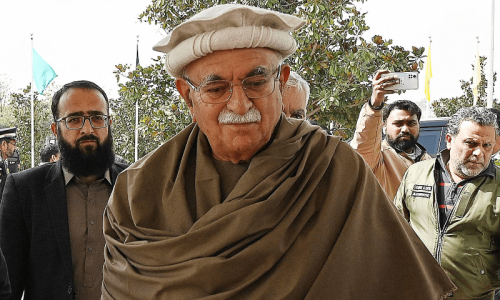ISLAMABAD: A Supreme Court bench was flabbergasted on Tuesday when it was told that no subsidy on food items has ever been extended to the neediest segments of Balochistan since the year 2009.
This is not all. Not a single fair price shop exists outside Quetta city to ensure the delivery of wheat flour or foodgrains at affordable prices to the poorest people of the province.
But provincial Food Director Ayaz Mandokhel said a summary for a Ramazan subsidy of Rs210 million had been prepared and sent to the authorities concerned.
The revelation came as a three-judge bench, headed by Justice Jawwad S. Khawaja, was hearing an application filed by Jamaat-i-Islami secretary general Liaquat Baloch on the plight of hapless citizens who are being forced to buy flour at exorbitant prices despite the fact that Pakistan is proclaimed to be “an agricultural country”.
Know more: SC asks centre, provinces to help determine consequences
The petitioner argued that a steep rise in the cost of living was taxing the meagre resources they had, making it hard to make ends meet and put food on the table for their families.
The bench was disturbed by the lack of seriousness displayed by federal and provincial governments in this regard and ordered the provincial food secretaries to appear in person on Monday with concrete proposals that went beyond the constitution of committees, to find practical ways to ensure that the neediest and poorest segments of society can receive the bare minimum of nutrition as guaranteed under the Constitution.
Examine: Govt’s failure to provide basic necessities angers Supreme Court
The respective food secretaries will have to come prepared to give an undertaking before the court that schemes so devised would be implemented, otherwise consequences would follow if the undertakings are not executed, the court warned in no ambiguous terms.
“Let this be the last opportunity,” the court observed, adding quite candidly that it was fed up with the inordinate delays incurred by the various governments.
“This is a cruel joke being played on the people of this country,” Justice Khawaja observed, adding that this was an unsatisfactory state of affairs and that even those who did not need subsidies assistance were receiving it.
National Food Security Secretary Seerat Asghar told the court that the federal government was providing Rs200 billion in food subsidy per annum, of which Rs118bn went to the Benazir Income Support Programme (BSIP), 80 per cent of which was spent on food and Rs8bn was set aside for the Pakistan Baitul Maal.
Expressing its disappointment, the court ordered the federal government to ensure that the amount allocated for food subsidy should be used only for food items.
Khyber Pakhtunkhwa Additional Advocate General Zahid Qureshi told the court that the provincial government had envisioned a scheme ensuring availability of essential food items to the neediest of citizens by developing a smart-card system based on data obtained from the National Database and Registration Authority (Nadra) and BISP.
Nearly Rs5bn has already been allocated in the provincial budget for 2014-15 to cover the targeted subsidy, in addition to the subsidy already provided on food items, he explained.
Punjab Additional Advocate General Razzaq A. Mirza said the provincial government had initiated a number of programmes to channel the government subsidy so that the poorest would be able to obtain the daily minimum nutrition as per the standards set by the government.
Currently, however, there is no scheme in place for the targeted delivery of foodstuff to the needy, he conceded.
Sindh Additional Advocate General Qasim Mir Jat told the court that the province had drafted the ‘Sindh Essential Commodity Price Control and Prevention of Profiteering and Hoarding Act’, which would be presented in the Sindh Assembly soon.
Published in Dawn, July 2nd, 2014













































